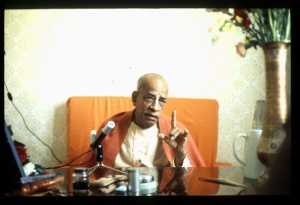SB 1.5.5: Difference between revisions
m (1 revision(s)) |
(Vanibot #0020: VersionCompareLinker - added a link to the Version Compare feature) |
||
| Line 1: | Line 1: | ||
{{info | {{info | ||
|speaker= | |speaker=Śrīla Vyāsadeva | ||
|listener= | |listener=Nārada Muni | ||
}} | }} | ||
[[Category:Srimad-Bhagavatam - Canto 01 Chapter 05|S05]] | |||
[[Category:Bhagavatam Verses Spoken by Vyasadeva - Vanisource|010505]] | |||
<div style="float:left">'''[[Srimad-Bhagavatam]] - [[SB 1|First Canto]] - [[SB 1.5: Narada's Instructions on Srimad-Bhagavatam for Vyasadeva|Chapter 5: Nārada's Instructions on Śrīmad-Bhāgavatam for Vyāsadeva]]'''</div> | |||
<div style="float:right">[[File:Go-previous.png|link=SB 1.5.4]] '''[[SB 1.5.4]] - [[SB 1.5.6]]''' [[File:Go-next.png|link=SB 1.5.6]]</div> | |||
{{CompareVersions|SB|1.5.5|SB 1962|SB 1972-77}} | |||
{{RandomImage}} | |||
==== TEXT 5 ==== | ==== TEXT 5 ==== | ||
<div | <div class="verse"> | ||
vyāsa uvāca | :vyāsa uvāca | ||
asty eva me sarvam idaṁ tvayoktaṁ | :asty eva me sarvam idaṁ tvayoktaṁ | ||
tathāpi nātmā parituṣyate me | :tathāpi nātmā parituṣyate me | ||
tan-mūlam avyaktam agādha-bodhaṁ | :tan-mūlam avyaktam agādha-bodhaṁ | ||
pṛcchāmahe tvātma-bhavātma-bhūtam | :pṛcchāmahe tvātma-bhavātma-bhūtam | ||
</div> | </div> | ||
| Line 18: | Line 24: | ||
==== SYNONYMS ==== | ==== SYNONYMS ==== | ||
<div | <div class="synonyms"> | ||
''vyāsaḥ''—Vyāsa; ''uvāca''—said; ''asti''—there is; ''eva''—certainly; ''me''—mine; ''sarvam''—all; ''idam''—this; ''tvayā''—by you; ''uktam''—uttered; ''tathāpi''—and yet; ''na''—not; ''ātmā''—self; ''parituṣyate''—does pacify; ''me''—unto me; ''tat''—of which; ''mūlam''—root; ''avyaktam''—undetected; ''agādha-bodham''—the man of unlimited knowledge; ''pṛcchāmahe''—do inquire; ''tvā''—unto you; ''ātma-bhava''—self-born; ''ātma-bhūtam''—offspring. | |||
</div> | </div> | ||
| Line 25: | Line 31: | ||
==== TRANSLATION ==== | ==== TRANSLATION ==== | ||
<div | <div class="translation"> | ||
Śrī Vyāsadeva said: All you have said about me is perfectly correct. Despite all this, I am not pacified. I therefore question you about the root cause of my dissatisfaction, for you are a man of unlimited knowledge due to your being the offspring of one [Brahmā] who is self-born [without mundane father and mother]. | Śrī Vyāsadeva said: All you have said about me is perfectly correct. Despite all this, I am not pacified. I therefore question you about the root cause of my dissatisfaction, for you are a man of unlimited knowledge due to your being the offspring of one [Brahmā] who is self-born [without mundane father and mother]. | ||
</div> | </div> | ||
| Line 32: | Line 38: | ||
==== PURPORT ==== | ==== PURPORT ==== | ||
<div | <div class="purport"> | ||
In the material world everyone is engrossed with the idea of identifying the body or the mind with the self. As such, all knowledge disseminated in the material world is related either with the body or with the mind, and that is the root cause of all despondencies. This is not always detected, even though one may be the greatest erudite scholar in materialistic knowledge. It is good, therefore, to approach a personality like Nārada to solve the root cause of all despondencies. Why Nārada should be approached is explained below. | In the material world everyone is engrossed with the idea of identifying the body or the mind with the self. As such, all knowledge disseminated in the material world is related either with the body or with the mind, and that is the root cause of all despondencies. This is not always detected, even though one may be the greatest erudite scholar in materialistic knowledge. It is good, therefore, to approach a personality like Nārada to solve the root cause of all despondencies. Why Nārada should be approached is explained below. | ||
</div> | </div> | ||
__NOTOC__ | |||
<div style="float:right; clear:both;">[[File:Go-previous.png|link=SB 1.5.4]] '''[[SB 1.5.4]] - [[SB 1.5.6]]''' [[File:Go-next.png|link=SB 1.5.6]]</div> | |||
__NOTOC__ | |||
__NOEDITSECTION__ | |||
Revision as of 11:28, 25 May 2020

A.C. Bhaktivedanta Swami Prabhupada
TEXT 5
- vyāsa uvāca
- asty eva me sarvam idaṁ tvayoktaṁ
- tathāpi nātmā parituṣyate me
- tan-mūlam avyaktam agādha-bodhaṁ
- pṛcchāmahe tvātma-bhavātma-bhūtam
SYNONYMS
vyāsaḥ—Vyāsa; uvāca—said; asti—there is; eva—certainly; me—mine; sarvam—all; idam—this; tvayā—by you; uktam—uttered; tathāpi—and yet; na—not; ātmā—self; parituṣyate—does pacify; me—unto me; tat—of which; mūlam—root; avyaktam—undetected; agādha-bodham—the man of unlimited knowledge; pṛcchāmahe—do inquire; tvā—unto you; ātma-bhava—self-born; ātma-bhūtam—offspring.
TRANSLATION
Śrī Vyāsadeva said: All you have said about me is perfectly correct. Despite all this, I am not pacified. I therefore question you about the root cause of my dissatisfaction, for you are a man of unlimited knowledge due to your being the offspring of one [Brahmā] who is self-born [without mundane father and mother].
PURPORT
In the material world everyone is engrossed with the idea of identifying the body or the mind with the self. As such, all knowledge disseminated in the material world is related either with the body or with the mind, and that is the root cause of all despondencies. This is not always detected, even though one may be the greatest erudite scholar in materialistic knowledge. It is good, therefore, to approach a personality like Nārada to solve the root cause of all despondencies. Why Nārada should be approached is explained below.